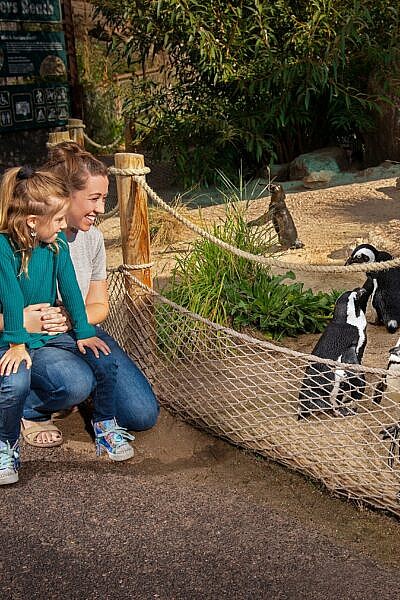Apart from being adorable and full of sassy antics, the African penguins at Cheyenne Mountain Zoo have a big job: to help visitors fall in love with and advocate for wild penguins. Napoleon, Biggs, Ivy and the rest of the flock inspire us to save wildlife and wild places, and their wild counterparts can use all the help they can get.

“Luckily, they have our guests’ and members’ support through our relationship with the Southern African Foundation for the Conservation of Coastal Birds (SANCCOB),” said Nicole Chaney, CMZoo conservation and sustainability coordinator. “Coastal birds, including African penguins, face a lot of challenges – especially right now. So, we continue to be exceedingly grateful for the amazing frontline efforts of the SANCCOB team.”
With guests’ and members’ support, CMZoo has previously sent staff to learn from and contribute to African penguin rehabilitation and release work at SANCCOB. CMZoo also provides ongoing support to fund staff for the Robben Island Ranger project, which allows on-site SANCCOB staff to monitor wild African penguin colonies, study them, and to react quickly if the birds need immediate support. As a member of the AZA African Penguin SAFE, CMZoo collaborates with a large team of penguin conservationists to pool resources and unite focuses and support African penguin conservation with the power of multiple organizations.
African penguins are endangered, with multiple ongoing factors negatively affecting their wild populations, including rising ocean temperatures and overfishing. Rising temperatures and changing ocean currents are causing adult penguins to molt during chick-rearing season. This means they’re not waterproof and are susceptible to hypothermia in cool ocean waters. Some have to turn back from fishing excursions without food for their families.
Overfishing has contributed to the decreasing abundance of fish that penguins can hunt in the wild, including small pelagic fish such as sardines and anchovies. Adult penguins raise their chicks in pairs, so while one parent stays with the chick or egg, the other parent hunts for food. With a dwindling food source, the hunting penguins must travel farther to find fish, leaving the parenting penguins without food for lengthy periods. Sometimes the parenting penguin responds as if the hunting parent won’t return, and abandons the chick or egg to find food.
SANCCOB saves abandoned African penguin eggs and chicks, incubates the eggs, and hand-rears the chicks, until they are strong enough for release back to the wild, where they will hopefully help grow the dwindling population. SANCCOB is the only organization in the world currently doing this. SANCCOB reports that hundreds of penguins were saved over the past year, thanks to rescue and rehabilitation efforts. Unfortunately, releases were delayed due to avian flu restrictions.
“In addition to all of these odds stacked against them, African penguins at SANCCOB are now affected by an outbreak of avian influenza within the rehabilitation facility, following an outbreak of the virus in wild bird populations in 2021 and 2022,” said Chaney. “SANCCOB is working hard to limit the spread of the flu while doing all they can to help birds through it. That meant setting up emergency off-site quarantine facilities and recovery teams, paying for expensive tests for the birds, and limiting volunteers and staff. So, more work, and more expenses with less hands.”

As well as providing ongoing funding for a variety of local and worldwide conservation efforts through Quarters for Conservation (Q4C) and the annual Member Conservation Vote, CMZoo has emergency reserves for immediate conservation needs. CMZoo responded to SANCCOB’s call for support in the amount of $5,000, which, along with the support of other organizations, allowed SANCCOB to quickly respond to the outbreak.
Despite extensive quarantine and biosecurity measures in place, the virus did spread among many birds, but SANCCOB reported the virus has not spread rapidly in most of their seabird patients and that many appeared to shed the virus and recover. A temporary off-site rehabilitation facility has been set up so that newly admitted seabirds can be cared for without exposing them to the birds under quarantine. They are optimistic that the penguins undergoing rehabilitation will continue to recover, and that no additional symptoms develop.
In January 2023, 51 healthy African penguins were reintroduced to the wild, despite the mountain of challenges SANCCOB endured. By visiting CMZoo, guests and members allow frontline conservation organizations, like SANCCOB, to monitor and respond to the immediate needs of the most vulnerable species on the planet. Next time you visit the flock at CMZoo, take a moment to recognize how the penguins you see before you are connected to the penguins that conservationists are working to save in the wild.
Special note: CMZoo’s veterinary, animal care and leadership teams are monitoring the local avian flu risk level closely, and have plans in place to protect the birds at CMZoo if the need arises.

